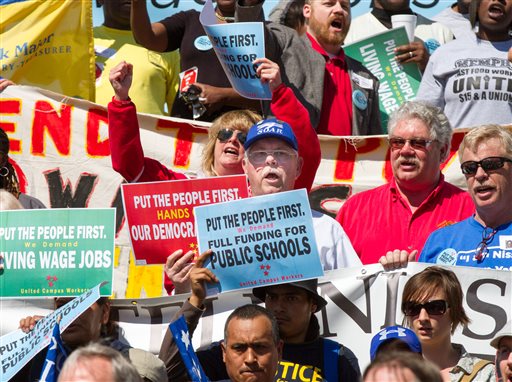Workers at TN Capitol rally seek higher minimum wage
Tuesday, March 11, 2014
By LUCAS L. JOHNSON II
Associated Press
NASHVILLE, Tenn. - A coalition of close to 200 workers rallied on the steps of the state Capitol today to speak out on issues ranging from increasing Tennessee's minimum wage to supporting public schools.
Following the rally about 30 of the protesters delivered a letter expressing their concerns to the office of Republican Gov. Bill Haslam.
Thomas Walker is a member of the United Campus Workers, one of about 24 organizations that are part of the coalition. He helped draft the letter, which stressed raising the state's minimum wage, one of the coalition's main concerns.
Currently, Tennessee's minimum wage is $7.25. A Democratic sponsored legislative proposal to raise it a dollar in the case of employers who don't offer health benefits failed in a House subcommittee last month.
Despite the measure's failure, Walker said his union is pushing for $12.50 an hour, which includes a living wage.
"We don't think that a minimum wage is enough to survive off of unless it's a living wage," he said. "And that's why we think $12.50 is the bare minimum that they should raise the wage to."
Protester Kyle Kordsmeier traveled from Memphis, where a living wage was killed last year.
"We as taxpayers are subsidizing poverty whenever we let people get away with paying poverty wages," said Kordsmeier, who is part of the Workers Interfaith Network.
The protesters also said the state should give more financial support to public schools, rather than vouchers -- or so-called "opportunity scholarships" -- which give parents the option to move a child from a failing public school to a private school, with the state providing funds for tuition.
Haslam has a proposal to create a school voucher program in Tennessee. He and some Republican lawmakers, who proposed a broader version of the legislation, are close to reaching a compromise.

